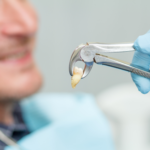Your smile is one of your most valuable assets, and taking care of your oral health is essential for overall well-being. However, there are numerous myths circulating about dental care that can lead to confusion and misinformation. In this blog post, we’re here to set the record straight by uncovering the truth behind common dental myths. Let’s dive in and learn the facts that will help you maintain a radiant smile and optimal oral health.
Myth 1: Brushing Harder Means Cleaner Teeth
Fact: Brushing your teeth too vigorously can actually harm your oral health. Scrubbing too hard can erode tooth enamel and damage sensitive gum tissue. Instead, opt for a gentle yet thorough technique using a soft-bristled toothbrush to effectively remove plaque and debris without causing harm.
Myth 2: Sugar is the Only Culprit for Cavities
Fact: While sugar is a significant contributor to cavities, it’s not the only factor. Starchy foods like chips and crackers can also break down into sugars that feed harmful bacteria in your mouth. Additionally, inadequate oral hygiene practices, such as infrequent brushing and flossing, can create an environment conducive to cavities.
Myth 3: You Don’t Need to Visit the Dentist if Your Teeth Look Fine
Fact: Regular dental check-ups are crucial even if your teeth appear healthy. Dentists can detect issues that may not be visible to the naked eye, such as early signs of cavities, gum disease, and oral cancer. Prevention is key, and catching problems early can save you from more extensive treatments later on.
Myth 4: Whitening Toothpaste Can Replace Professional Teeth Whitening
Fact: While whitening toothpaste can help remove surface stains, it’s not as effective as professional teeth whitening treatments. If you’re looking for a significantly brighter smile, consult your dentist for safe and effective whitening options tailored to your needs.
Myth 5: Chewing Sugar-Free Gum is as Good as Brushing
Fact: Chewing sugar-free gum can stimulate saliva production, which helps neutralize acids and wash away food particles. However, it’s not a substitute for proper brushing and flossing. These habits are essential for removing plaque and maintaining healthy teeth and gums.
Myth 6: Baby Teeth Aren’t Important Since They’ll Fall Out Anyway
Fact: Baby teeth play a crucial role in speech development, proper chewing, and holding space for permanent teeth. Neglecting baby teeth can lead to issues that impact the alignment and health of incoming adult teeth.
Myth 7: If Your Gums Bleed, Avoid Brushing Them
Fact: Bleeding gums can be a sign of gum disease, which is often caused by inadequate oral hygiene. Continuing to brush gently and consistently, along with flossing, can help improve gum health. If bleeding persists, consult your dentist for a thorough evaluation.
Conclusion
Maintaining a healthy smile involves separating fact from fiction when it comes to dental care. By dispelling these common dental myths, you’re better equipped to make informed decisions for your oral health.








